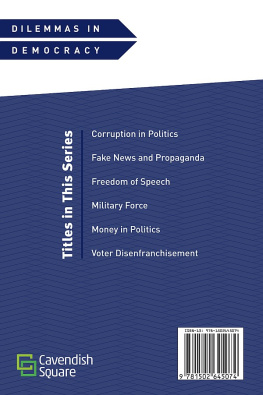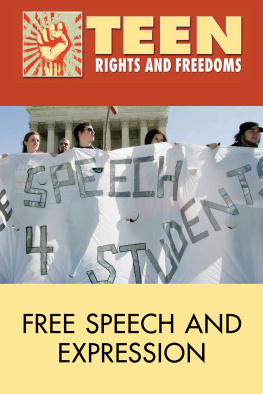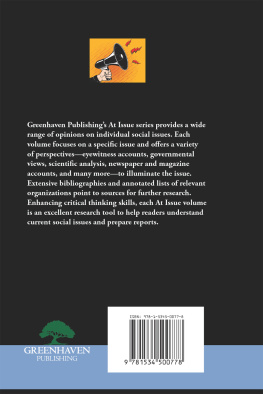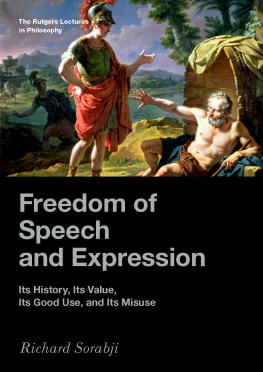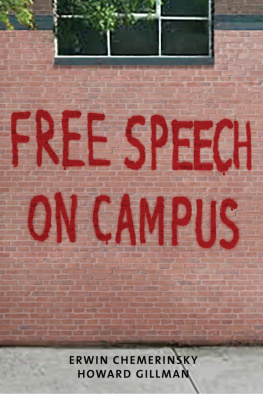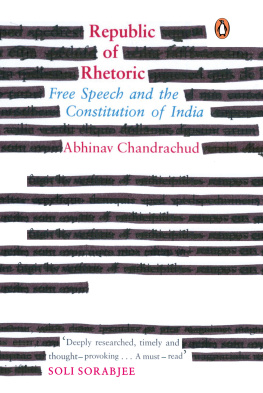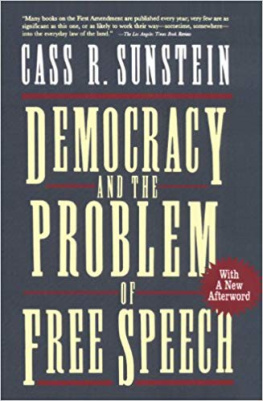FREE SPEECH
Also by Timothy Garton Ash
Facts Are Subversive
Free World
History of the Present
The File
In Europes Name
The Magic Lantern
The Uses of Adversity
The Polish Revolution
FREE SPEECH
Ten Principles for a Connected World
Timothy Garton Ash

ATLANTIC BOOKS
London
First published in hardback in the United States of America in 2016 by Yale University Press.
First published in hardback in Great Britain in 2016 by Atlantic Books, an imprint of Atlantic Books Ltd.
Copyright Timothy Garton Ash 2016
The moral right of Timothy Garton Ash to be identified as the author of this work has been asserted by him in accordance with the Copyright, Designs and Patents Act of 1988.
All rights reserved. No part of this publication may be reproduced, stored in a retrieval system, or transmitted in any form or by any means, electronic, mechanical, photocopying, recording, or otherwise, without the prior permission of both the copyright owner and the above publisher of this book.
The lyrics for Nina Simones song I Wish I Knew How It Would Feel to Be Free, Written by Billy Taylor and Dick Dallas, are quoted by permission. The lyrics for Eminems song White America, written by Steven King, Jeffrey Bass, Luis Resto and Marshall Mathers, published by Eight Mile Style LLC and Martin Affiliated LLC, administered by Kobalt Music Publishing Limited, are also quoted by permission.
A catalogue record for this book is available from the British Library.
Hardback: 978-1-84887-092-5
E-book: 978-1-78239-031-2
Paperback: 978-1-84887-094-9
Printed in Great Britain
Atlantic Books
An Imprint of Atlantic Books Ltd
Ormond House
2627 Boswell Street
London
www.atlantic-books.co.uk
To
All contributors to Free Speech Debate
freespeechdebate.com
CONTENTS
Weall human beingsmust be free and able to express ourselves, and to seek, receive and impart information and ideas, regardless of frontiers.
We neither make threats of violence nor accept violent intimidation.
We allow no taboos against and seize every chance for the spread of knowledge.
We require uncensored, diverse, trustworthy media so we can make well-informed decisions and participate fully in political life.
We express ourselves openly and with robust civility about all kinds of human difference.
We respect the believer but not necessarily the content of the belief.
We must be able to protect our privacy and to counter slurs on our reputations, but not prevent scrutiny that is in the public interest.
We must be empowered to challenge all limits to freedom of information justified on such grounds as national security.
We defend the internet and other systems of communication against illegitimate encroachments by both public and private powers.
We decide for ourselves and face the consequences.
FREE SPEECH
POST-GUTENBERG
We are all neighbours now. There are more phones than there are human beings and close to half of humankind has In our cities, we rub shoulders with strangers from every country, culture and faith. The world is not a global village but a global city, a virtual cosmopolis. Most of us can also be publishers now. We can post our thoughts and photos online, where in theory any one of billions of other people might encounter them. Never in human history was there such a chance for freedom of expression as this. And never have the evils of unlimited free expressiondeath threats, paedophile images, sewage-tides of abuseflowed so easily across frontiers.
This unprecedented world-as-city has been shaped by the United States, that liberal leviathan, and to a lesser extent by other countries of the historic West. Today, however, both the right and the power of the West to set the terms for cosmopolis are being fiercely contestedby China above all, but also by rising powers such as India and Brazil. Each new-old power brings to the discussion of free speech its own cultural heritage and historical experience, the lessons from which are themselves hotly contested inside each of those countries.
When it comes to enabling or restricting global freedom of expression, some corporations have more power than most states. Were each user of Facebook to be counted as an inhabitant, Facebook would have a larger population than China. Without their usersusthese giants would be nothing.
Nonetheless, I maintain that the basic character of the challenges we face in this world of neighbours is now clear.
What is more, this transformation of communication itself offers new possibilities for addressing changes as they happen. When I started writing this book, I thought I was just going to write a book. Some nine months after I delivered it to my publishersdelivery has traditionally been to typescripts what conception is to babiesa pleasing little object, wrapped in swaddling cloth, would plop through the letterbox. What Johann Gutenberg called the work of books would carry on as it had for centuries. But as I pursued my research at Stanford University, in the heart of Silicon Valley, I asked myself: If your subject is the post-Gutenberg world, how can you rest content with writing about it only in the old Gutenberg way? If the internet gives unprecedented opportunities for people across the world to speak freely, and to debate free speech, why not explore those opportunities as an integral part of writing this book?
I therefore turned aside to develop, with a team at Oxford University, an experimental website called Quite a few of the illustrative stories I tell, especially those from countries beyond the West, were thrown up in the course of this experiment.
If you are reading these words in the traditional Gutenberg form, printed on paper, then endnotes point you to material on the site, amongst many other sources. If you are reading them on a connected device, then what you have in your hands is a post-Gutenberg book. Future post-Gutenberg books will doubtless take many forms, but I visualise this one as an electronic pyramid (see ).
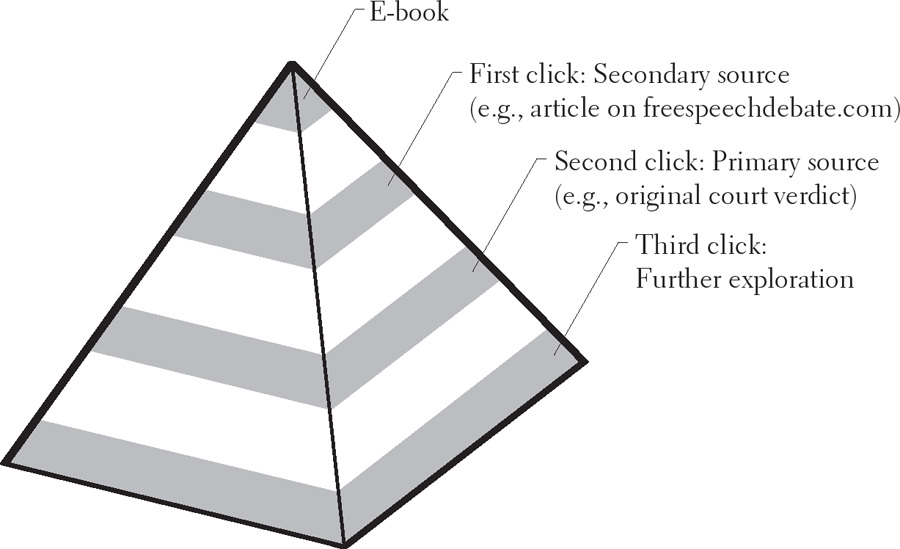
Figure 1. A post-Gutenberg book
Thus, for example, clicking at For other subjects, the process may require another click or two, depending how many levels or hidden chambers inside the pyramid you wish to explore. The click-through model is entirely familiar in online journalism but has yet to become the norm for e-books, so embedding links in the main text is itself an exploration of the possibilities of a connected world.
I contend that the way to live together well in this world-as-city is to have more and better free speech. Since free speech has never meant unlimited speecheveryone spouting whatever comes into his or her head, global logorrheathat entails discussing where the limits to freedom of expression and information should lie in important areas such as privacy, religion, national security and the ways we talk about human difference. As important, it means identifying positive methods and styles that will enable us to use this defining gift of humankind to best advantage, in these conditions of unprecedented opportunity and risk.
The philosopher Michel Foucault tells us that the Epicurean thinker Philodemus (himself reporting the lectures of Zeno of Sidon) argued that the use of free speech should be taught as a skill, like medicine or navigation. I dont know how much of that is Zeno or Philodemus, and how much Foucault, but it seems to me a vital thought for our time. In this crowded world, we must learn to navigate by speech, as ancient mariners taught themselves to sail across the Aegean Sea. We can never learn if we are not allowed to take the boat out.
Next page

